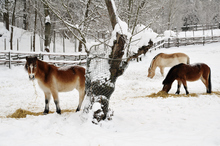A horse’s body weight normally fluctuates a little due to the season, the horse’s age, health status, parasite and worm load, dental condition, amount of concentrates given, access to pasture, exercise, and other factors. Some horses tend to loose weight during cold weather.

Importance of cold weather care of horses
Although most horses are very adaptable to cold weather, they must be managed sensibly during winter, and higher quality feed and better shelter may be necessary.
Although most horses are very adaptable to cold weather, they must be managed sensibly during winter. A basic review of energy (heat) exchange in the horse will help to explain why certain management practices are necessary during cold weather.
The easiest way to understand the impact of cold weather on a horse is based on the heat (energy) balance equation. Heat or energy balance is the difference between heat loss and heat gain over time. If heat gain exceeds heat loss over time, the horse will gain weight.
If heat loss exceeds heat gain, the horse will lose weight. The most important loss of heat in cold weather is to the environment. Warm objects lose heat to the environment whenever air temperature is colder than the object.
Horses, whose skin temperature is about 30 degrees C, will lose heat to the air around them whenever the air temperature is below 30 degrees C. The colder the air around the horse, the greater the heat loss will be. The main source of heat gain is the energy from calories that convert to heat that are obtained from feed. Other minor sources of heat gain are muscular activity, the sun and mechanical heat in barns.
Thermoregulation in horses during cold weather:
Horses respond in two ways to cold: acutely or immediately and chronically by adapting or acclimatization. The immediate response of a horse to a sudden change in temperature is to change its behavior.
Horses will seek shelter from the cold and wind, or huddle together, to decrease heat loss. Horses stop foraging and stop moving to conserve energy. Horses in cold, windy conditions typically stand with their heads away from the wind, their tails set low and into the wind.
Shivering and other voluntary muscular activity can generate substantial body heat. It is not unusual to see horses running in cold weather. The muscular contraction involved in physical activity, such as running, results in heat production.
In the dissipation of this heat, the horse's inner body core (heart, liver, intestine, etc.) is warmed. Thyroid hormone secretion is increased during sudden cold exposure in adult horses, but this response is short-lived. Horses will also vasoconstrict (reduce) blood flow to the extremities, such as the lower legs, the ears and the muzzle, and their hair will stand up (piloerection) to effectively increase the haircoat depth.
Helping your horse adapt to cold weather without loosing weight
The horse's ability to adapt to cold depends on the duration of the cold weather and on the horse's energy intake. The latter factor, energy intake, is the most critical in determining how readily a horse develops a tolerance for cold. Horses lose weight if they do not eat enough energy to offset the heat loss to the cold surrounding air.
Enough feed and good-quality feed are needed to supply adequate energy intake for the horse. Fat horses are able to mobilise some of their fat deposits as energy during cold snaps but enough good feed is the main solution for keeping horses in good condition through winter.
Well-fed horses adapt without problem to cold weather, whereas unfed horses lose weight and lose cold tolerance. Yearling horses fed a high quality diet free-choice are able to tolerate temperatures as low as -11°C with no ill effect. Horses will generally eat to meet their energy requirements. In cold weather, feeding good quality hay free-choice is the simplest way to ensure that the horse will meet its energy requirements.
